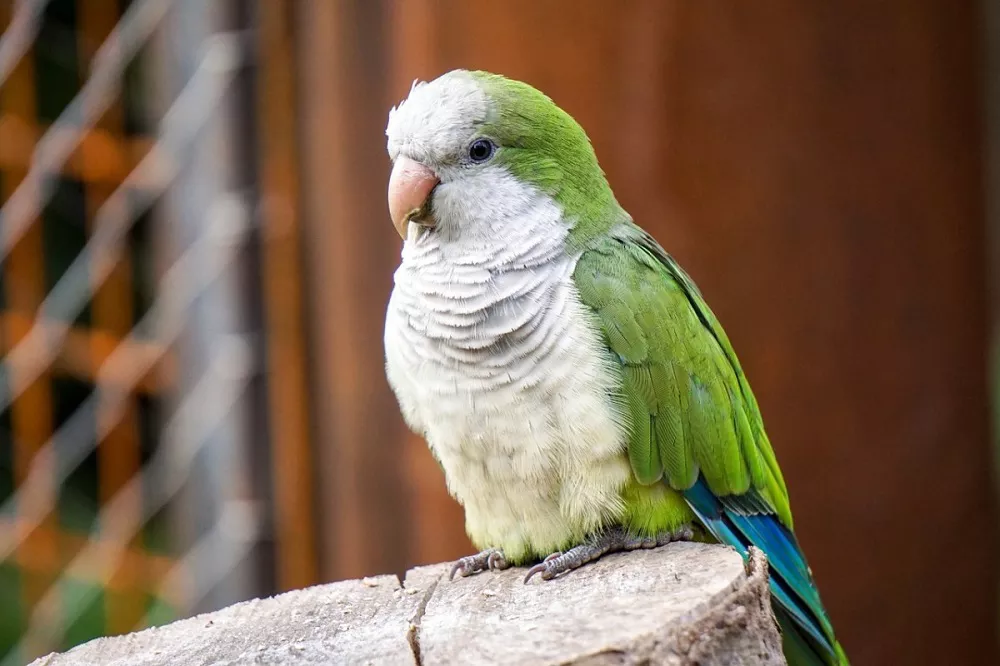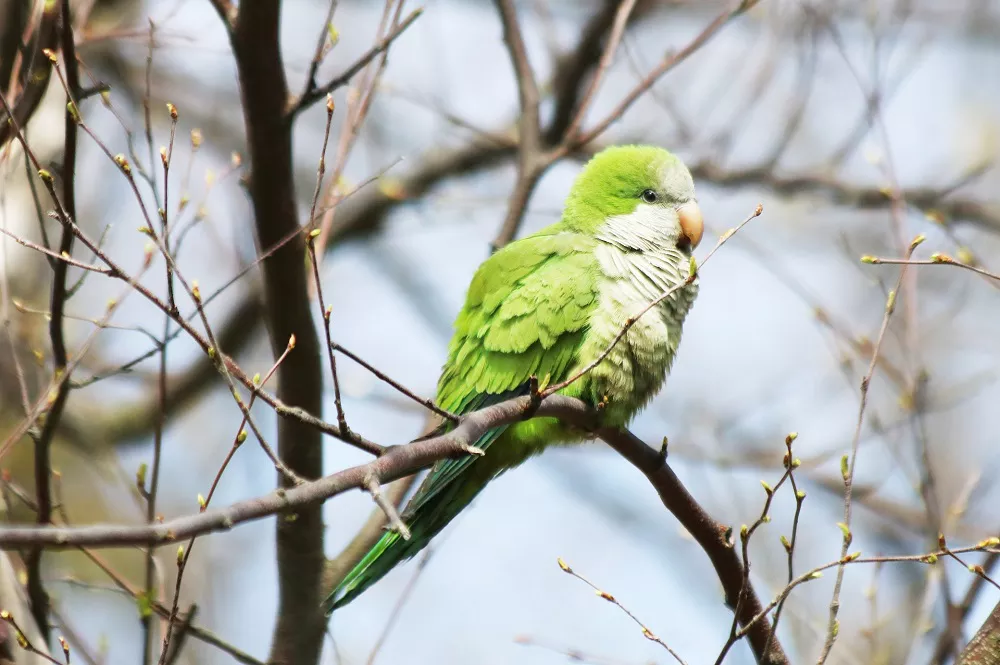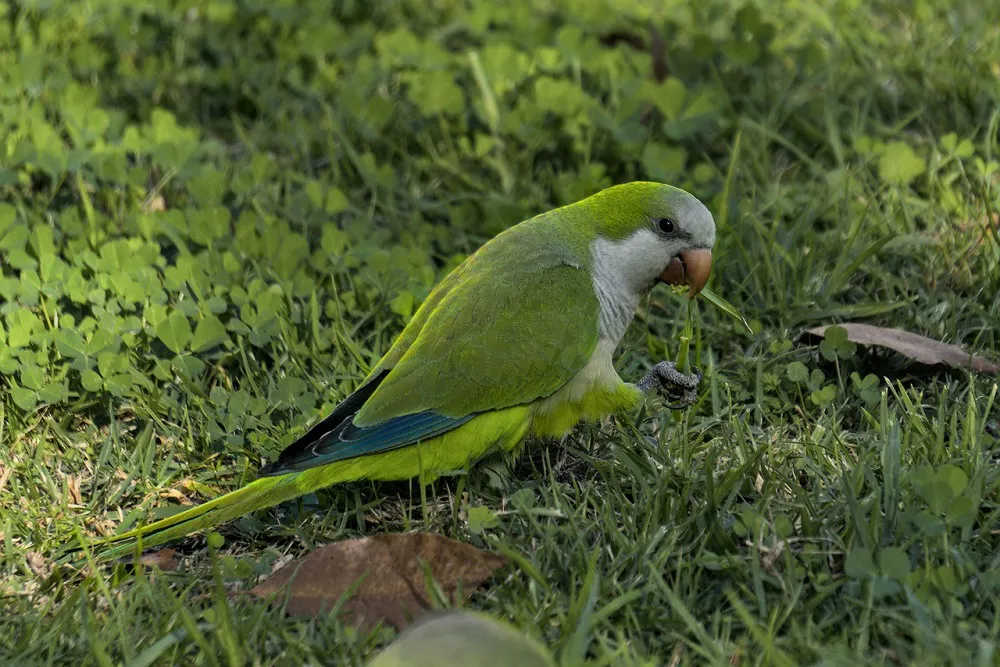Quaker parrots, also known as Monk Parakeets (scientific name: Myiopsitta monachus), are small, green birds known for their intelligence, playful personalities, and exceptional talking ability. Originating from South America, particularly Argentina and surrounding countries, they have become popular pets in many parts of the world.
These birds are a favorite among bird lovers due to their vibrant plumage, sociable behavior, and the unique quaking motion they make, which earned them the name “Quaker.”
In this article, we will explore everything you need to know about the lifespan of Quaker parrots. We will look at the factors that influence their longevity, compare lifespans in the wild and in captivity, and provide tips to help your feathered friend live a long and healthy life.
What Is the Average Lifespan of a Quaker Parrot?
Quaker Parrots Lifespan in Captivity
In captivity, Quaker parrots can live for 20 to 30 years, and in some cases, even longer with excellent care. This long lifespan makes them a long-term commitment, similar to owning a dog or a cat.
Their long life is one of the reasons why they are such cherished pets. But to reach this age, they need the right environment, proper diet, regular veterinary care, and lots of mental stimulation.
Quaker Parrots Lifespan in the Wild
In the wild, Quaker parrots tend to have a shorter lifespan, typically 10 to 15 years. The difference in lifespan is due to natural dangers such as predators, food scarcity, diseases, and environmental changes.
Why Do Quaker Parrots Live Longer in Captivity?
Captive parrots benefit from the safety and stability of a home environment. Let’s look at the main reasons why their lifespan is longer when cared for as pets:
1. Protection from Predators
In the wild, Quakers are prey to many animals like hawks, snakes, and larger mammals. At home, they are protected from such threats.
2. Regular Food Supply
Pet Quakers receive a consistent diet, which is often rich in nutrients. Wild parrots have to forage for food and may go hungry or eat less nutritious items.
3. Veterinary Care
Captive parrots can get medical attention when they are sick. Vaccinations, check-ups, and treatments can extend their lives significantly.
4. Reduced Environmental Stress
Pet birds don’t face the challenges of harsh weather, droughts, or deforestation. Their environment is controlled and more comfortable.
Factors That Influence a Quaker Parrots Lifespan
Many things can affect how long a Quaker parrot lives. Some are related to their environment and care, while others are genetic. Here are the most important factors:
Diet and Nutrition
A healthy diet is the foundation of a long life for a Quaker parrot. A poor diet can lead to obesity, liver disease, and vitamin deficiencies.
Best Foods for Quaker Parrots:
- Fresh vegetables (carrots, kale, spinach)
- Fresh fruits (apples, berries)
- High-quality pellets (specially made for parrots)
- Occasional seeds and nuts (as treats, not main food)
See Also: Can Quaker Parrots Eat Bananas?
Avoid feeding them:
- Avocados (toxic to birds)
- Chocolate
- Caffeinated drinks
- Salty or sugary foods
Cage and Living Conditions
Quakers need a spacious and clean cage. A cramped or dirty environment can cause stress and illness. The cage should have perches, toys, and space for flying or climbing.
Exercise and Mental Stimulation
Quaker parrots are smart and active. Without enough stimulation, they can become bored and develop behavioral problems like feather plucking or excessive screaming.
To keep them engaged:
- Offer a variety of toys
- Change toys regularly
- Allow out-of-cage time daily
- Teach them tricks or simple tasks
Social Interaction
These parrots are social and bond closely with their human family or other birds. Loneliness can lead to depression and health problems.
Spending time with your bird every day is essential for its well-being.
Genetics and Breeding
Just like people, some birds are born healthier than others. Birds from responsible breeders tend to live longer because they are raised in better conditions and selected from healthy parent birds.
See Also: Can Quaker Parrots Talk?
Signs of a Healthy Quaker Parrot
How can you tell if your bird is doing well? Look for these signs:
- Bright, alert eyes
- Smooth, shiny feathers
- Clean nostrils and beak
- Normal droppings (not too watery or discolored)
- Active and playful behavior
- Good appetite
- Regular observation helps catch health problems early.
Common Health Issues in Quaker Parrots
Even with good care, Quakers can develop health problems. Knowing the signs can help you act quickly.
1. Psittacosis (Parrot Fever)
Caused by bacteria, symptoms include:
- Respiratory problems
- Lethargy
- Green droppings
It can spread to humans, so early vet care is important.
2. Feather Plucking
Often caused by stress, boredom, or nutritional deficiency.
3. Fatty Liver Disease
Common in birds that eat too many seeds. Signs include:
- Obesity
- Lethargy
- Yellow tint to feathers
4. Beak and Feather Disease
A viral condition that affects the growth of feathers and beak.
5. Egg Binding (in females)
When a female can’t lay an egg, it becomes a life-threatening emergency.
How to Increase Your Quaker Parrot’s Lifespan
Want your bird to live a long, happy life? Here are some tips:
Provide a Balanced Diet
Feed a mix of pellets, fresh vegetables, and occasional fruits. Avoid high-fat foods and limit seeds.
Keep the Cage Clean
Regularly clean food bowls, perches, and cage trays to prevent disease.
Visit the Vet Regularly
Annual checkups can help detect problems early.
Offer Daily Interaction and Play
Talk to your bird, let it out of the cage to stretch its wings, and provide fun challenges.
Avoid Toxins
Keep the bird away from:
- Teflon cookware (fumes can be deadly)
- Cigarette smoke
- Air fresheners and sprays
- Poisonous houseplants
Ensure Safety at Home
Close windows and doors when your bird is out. Watch out for ceiling fans and other household dangers.
Conclusion
Quaker parrots are incredible pets that can be with you for decades. Their long lifespan means they require long-term care, love, and attention. With the right diet, environment, and medical care, your feathered friend can live a full and joyful life.
By understanding the needs of your Quaker parrot and making its health a priority, you are not just extending its life—you are making every year a happy and enriching experience for both of you.
Frequently Asked Questions (FAQs)
1. How long do Quaker parrots live as pets?
Quaker parrots, also known as Monk Parakeets, typically live 20 to 30 years in captivity with proper care, a healthy diet, and regular veterinary checkups. Their lifespan can be influenced by genetics, environment, and how well their physical and emotional needs are met.
2. Are Quaker parrots high maintenance?
Yes, Quaker parrots are considered moderately to high maintenance pets. They are highly intelligent and social, requiring daily interaction, mental stimulation, and a spacious cage with toys. Neglecting their emotional needs can lead to behavioral problems such as screaming or feather plucking.
3. What are the cons of Quaker parrots?
While charming and affectionate, Quaker parrots come with several challenges:
- Loud vocalizations – They can be quite noisy, especially if bored.
- Territorial behavior – Known for defending their cage space aggressively.
- Destructive chewing – They love to chew, often on furniture or wires.
- Long commitment – Their long lifespan requires a long-term dedication.
- Legal issues – In some places, owning them is illegal (see next question).
4. Why are Quaker parrots illegal?
Quaker parrots are illegal or restricted in certain U.S. states (like California and Pennsylvania) due to their reputation as aggressive agricultural pests. In the wild, their hardy nature and communal nest-building habits allow them to thrive and potentially harm crops or displace native species if released or escaped.
5. Blue Quaker parrot lifespan
Blue Quaker parrots are a color mutation of the green Quaker, and they have the same lifespan—typically 20 to 30 years with proper care. The color mutation does not affect their health or longevity.




 Facebook
Facebook  Instagram
Instagram  Youtube
Youtube 